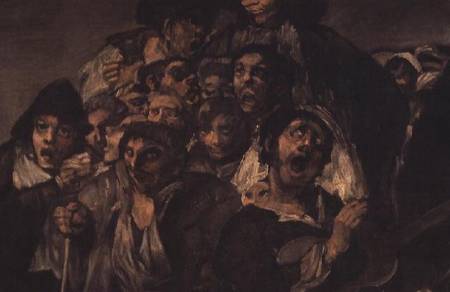The atmosphere, expected and
unwelcome, enveloped him. The smell of heated,
sinking putrefaction; cloying, disturbing, suffusing itself into every pore,
clinging to every garment, a portent and foretaste of the grave’s greater
appetite to undo the vitals of life. The
stench of sores, of infection, of ageing skin, of decomposition already working
in the depths of the organs and forcing itself out, of dental rot.
When John returned home he
would furiously shower and scrub to remove the lingering odour of the
place. He glanced around the room to see
a thinning number of shrunken, withered, human beings; of people embedded in
permafrost. Their years having drawn
nigh, the make-up of homo sapiens was
slowly, inexorably, being stripped away.
This was a charnel house for the living, a parlour furnished for those
enduring a double death.
The experiences of close
relatives followed a familiar pattern.
Like a wound that never healed, each visit brought back the visceral
awareness of first losing them in the consuming fog of dementia. The memory of a life irretrievably lost, as
the fragility of mind and will found no escape from the ineluctable reach of
this preternatural shroud, abided as a mournful presence in the room.
At times the pressure of this
sadness seemed so great, so palpable, it was as if the room would soon totter
and collapse under the weight of it. John
now belonged to the ranks of those who came to watch and wait for the body to
give way. He shared in this futility,
belonged to a fellowship of fellow sufferers, knew their sense of emotional
exhaustion and used up grief, and
counted down to the moment when a strange sense of relief would inevitably come. But although his experience was not a-typical
there was about his demeanour, as any health professional and close observer of
human behaviour could see, an element of detachment more akin to indifference
than to weariness.
A single thread, delicate as
gossamer, held him to this place; a bond of nature tightly anchored, wearing
thin, biologically weakening. Across
the room, amid the grotesque forms of what looked to him like so many animated
cadavers sat listlessly on chairs, stood his father.
A tall man in his prime, he
had begun to bow and stoop. Equine like
strength having left him, his ill-fitting clothes hung loosely upon his rigid,
calcified frame, giving him the resemblance of a badly dressed weather worn scarecrow. His skin was sallow. His pock marked face sported a day’s growth
of greying stubble. The eyes were as
bloodshot and hollow as a drunk’s.
Vacant holes, bereft of the power of recognition.
The lower lip glistened and protruded
with a childlike defiance, bearing the sullen aspect of one whose ambitions had
been curtailed by a superior force. He
was diminishing with every grain of sand that passed through the aperture of an
egg-timer. It was hard not to pity him,
not to pity what he had become, what he had been contorted into by the downward
drag of this mental illness.
But there was a darkly comedic
element to his appearance, an inappropriate adornment that struck a note of
sick humour. As a result of repeated
bumps, scrapes, and falls, his wakening hours forced upon him the wearing of padded
head gear that made him resemble an amateur boxer. Without his knowing it George Daniels cut a
tragic, pathetic, risible figure. He was
now a parody of the man captured in the photographs in his son’s home.
“Come on now George, your boy
is here to see you”
“Who?”
“Your son, John”
“I’ve got a son?”
“Yes George. He’s come to see you”
“I’ve never seen him before”
“Yes you have George
“Have I. Oh.
That’s nice. Is that him? What’s he here for? Has he been to seen me before?”
“Yes George”
“Why is he here now? What does he want?”
“Come one now George, he
always comes to see you”
This patient, reassuring note,
daily struck in the tone of the staff nurse seemed illimitable. It always did. Her voice had in it a perpetual calmness,
never once betraying a hint of anger, of annoyance. Where did that kind of patience come
from? Was she born with it? Was it a gift? Was it cultivated? Was it simply a fake professional demeanour,
a façade concealing an interior of impersonal indifference?


1 comment:
Part 2 as good as Part 1! I'm eagerly awaiting Part 3 and then more..
Post a Comment